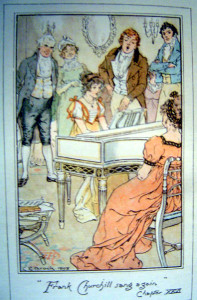Today I have the honor and privilege of having a guest post published for the Austen in August event being hosted at Lost Generation Reader.

One aspect of Jane Austen’s work that I absolutely love is that each novel differs from the others. In Northanger Abbey, Austen’s rebuts the Gothic Romance novel. Sense and Sensibility contains Austen’s response to the Romanticism of her age. Pride and Prejudice depicts love triumphant overcoming pride, prejudice, the social cast system, and embarrassing family members. In, Mansfield Park — Austen’s most theological work — she contrasts many things, one being the mere learning of Maria and Julia versus Fanny’s learning to develop true character. In Persuasion, we enjoy an ode to the Navy, the portrayal of Meritocracy, and a second chance at a love thought dead. Emma, the subject of this post, has been called Austen’s agrarian novel. And certainly an agrarian theme is present. However, a stronger theme is found within Emma: speculation and conjecture of neighbors’ motives. In spite of all the speculation and conjecture throughout, Austen shows that guessing correctly at another’s motives is a near-impossible task.

Nicely done. Left a comment there.
Thanks, Tim! Or is that, Mr. John Knightley, the shorter. 😉